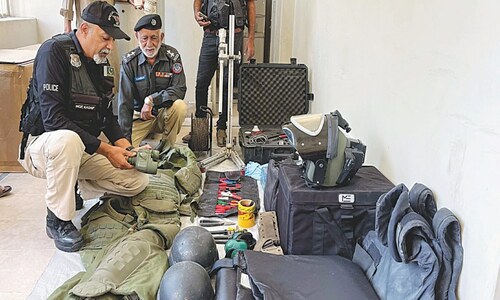
KARACHI: The Spinner’s Tale, a novel by Senior Superintendent of Police Omar Shahid Hamid, is being translated into Italian.
The story, which looks to understand the transformation to the militant mindset, should be relevant in this day and age, especially for European readers, who are still struggling to understand the radicalisation of local youth there.
The translation has been made possible through the Italy Reads Pakistan award by the publishing company Metropoli d’Asia and the consulate of Italy in Karachi. The book was launched during the 7th Karachi Literature Festival (KLF) in 2016 and was awarded this year on the second day of the 8th KLF.
The novel is the second one by Omar, who heads the Counter-Terrorism Department’s intelligence unit. Omar has also written two more novels, his first, The Prisoner, was published in 2013 and his latest, The Party Worker, in 2017. But it was only his second novel The Spinner’s Tale that fit the eligibility criteria of the award that included the author being under 45 years of age and the book to have been published in Pakistan or South Asia in 2014, 2015 and 2016.
Metropoli d’Asia is a publishing company based in Milan that is founded by writer and essayist Andrea Berrini. The objective of the Italy Reads Pakistan award is to discover, translate and offer contemporary innovative writing by Asian authors to reach a wide public. That is why the publisher looks for books with urban settings by the authors who experience their reality first hand.
“Italy has the second-biggest community of Pakistanis in Europe after the UK,” said Dr Gianluca Rubagotti, the Consul General of Italy in Karachi, while speaking to Dawn. “So there is a market for the novel there,” he added.
About the award, he said it was different from other literary awards which usually carried monetary prizes because “we wanted to do something that would also benefit the Pakistani community in Italy.”
He continued: “There is a lack of knowledge both of what Italy is like here in Pakistan and what Pakistan really is like in Italy. Given the fact that Italian readers read in the Italian language, and there is a very small market for English and even other languages’ literature there, if we really want people in Italy to have an idea of what’s going in a country from a literature point of view, the only way is to get things translated,” said the consul general.
About the selection process for the award, he said that in Pakistan they had a jury comprising Bina Shah, H.M. Naqvi and Salman Kureshi. “And since this project is really about bringing the two communities together, we also wanted Pakistani Italians involved in picking the winner. So after the local jury, who gave their separate opinions, which we sent to Italy there was also a jury of Italian Pakistanis who also read the book to give us their opinion,” said Dr Rubagotti, while sharing that they received 19 books, including Urdu books, as submissions for the prize initially. “Now work on the translation has already been started. The idea is to have the translation launched in the next KLF,” he added.
Omar Shahid Hamid, the author of the book, said he wasn’t here when the prize was first launched. “My mother saw the announcement and invitation for submissions. She informed me and then I emailed Oxford University Press to ask how to go about it,” he said.
The book, he thought, is topical as you have had the issue of terrorism across Europe fostered by young men in France and Belgium, who are radicalised but are French or Belgian. “The book is about a young man coming from a very secular type of background who slowly becomes radicalised to turn into this monstrous figure. So it should be a very interesting theme for readers in Europe,” he said.
About whether his work in the police force has helped him in gathering ideas for his novels, Omar said it absolutely did. “If I were not a police officer I don’t think I would have been able to write these books. I am in counter-terrorism, which gives me a lot of material to work with. I have interrogated literally hundreds of suspects from where I get great ideas, and great stories,” he admitted.
Asked why he hadn’t thought of translating his books into Urdu first, the author said they should be translated by someone professional and someone who had the time to translate them. “I don’t really have that much time,” he said.
Asked then if he knew any Italian, he laughed saying that he had committed to learn a bit of Italian so that he could follow the translation. And how does he intend to learn Italian? “Italian films! I think I am going to get Il Postino and the Godfather trilogy and rewind all the bits that have Italian,” he joked.
Published in Dawn, February 22nd, 2017













































Dear visitor, the comments section is undergoing an overhaul and will return soon.